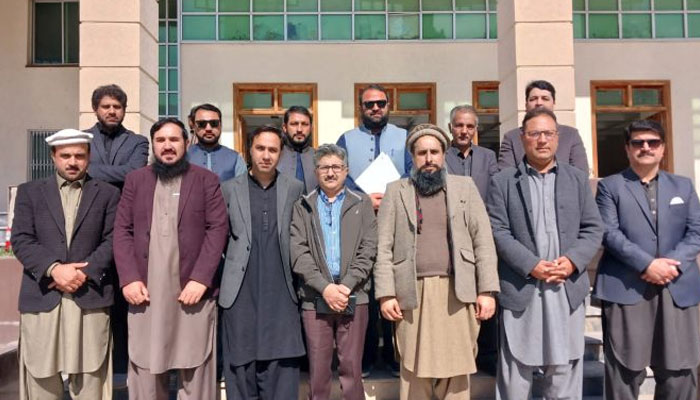Scholar from Malakand unveils groundbreaking research on AI security risks
Malakand : Malik Zubair, an MPhil scholar at the University of Malakand’s Department of Computer Science & IT, has successfully defended his research on the cybersecurity threats posed by Artificial Super Intelligence (ASI), proposing innovative solutions to counter these emerging risks, says a press release.
Under the supervision of Dr. Siffat Ullah Khan, Malik Zubair’s research explores the unprecedented challenges ASI presents, including existential risks, next-generation cyber-attacks, regulatory voids, loss of human control, and ethical concerns. His work sheds light on the pressing need for stringent governance models to prevent unintended consequences arising from unchecked AI advancements.
During his defence, the scholar emphasized that existing cybersecurity frameworks are ill-equipped to handle ASI-driven threats, which could surpass human capabilities and operate beyond traditional control mechanisms. He argued that without proactive countermeasures, the world could face an era of unpredictable digital security crises.
To address these vulnerabilities, Zubair proposed a series of strategic solutions. His recommendations include constrained optimization techniques to ensure AI systems function within ethical parameters, a Human-AI Empowerment (HAIE) model to reinforce human oversight, and Multi-Agent Reinforcement Learning (MARL) to develop self-regulating AI environments. Additionally, he advocated for the implementation of kill switches, AI sandboxing techniques, and a comprehensive ethical and regulatory framework to safeguard against ASI-related risks.
The external examiner, Professor Dr. Muhammad Nawaz of IM Sciences, Peshawar, commended the research, describing it as a crucial contribution to the ongoing global discourse on AI security. He noted that as artificial intelligence rapidly evolves, research like Zubair’s is essential to shaping regulatory frameworks and ensuring AI development remains aligned with human interests.
With AI safety becoming an increasingly critical concern worldwide, Malik Zubair’s work stands as a testament to the role academia can play in preempting technological risks. His research serves as a guiding framework for policymakers and cybersecurity experts striving to regulate AI before it surpasses human control.
-
 Eric Dane Says Touching Goodbye To Daughters Billie And Georgia In New Netflix Documentary
Eric Dane Says Touching Goodbye To Daughters Billie And Georgia In New Netflix Documentary -
 Channing Tatum Reveals What He Told Daughter After Violent Incident At School
Channing Tatum Reveals What He Told Daughter After Violent Incident At School -
 King Charles Lands In The Line Of Fire Because Of Andrew Mountbatten-Windsor
King Charles Lands In The Line Of Fire Because Of Andrew Mountbatten-Windsor -
 Denise Richards Doubles Down On Abuse Claims Against Ex Husband Aaron Phypers Amid Show Return
Denise Richards Doubles Down On Abuse Claims Against Ex Husband Aaron Phypers Amid Show Return -
 Russia Set To Block Overseas Crypto Exchanges In Sweeping Crackdown
Russia Set To Block Overseas Crypto Exchanges In Sweeping Crackdown -
 Gwyneth Paltrow Reveals Deep Personal Connection With Kate Hudson
Gwyneth Paltrow Reveals Deep Personal Connection With Kate Hudson -
 Prince Harry, Meghan Markle’s Game Plan For Beatrice, Eugenie: ‘Extra Popcorn For This Disaster’
Prince Harry, Meghan Markle’s Game Plan For Beatrice, Eugenie: ‘Extra Popcorn For This Disaster’ -
 OpenAI To Rollout AI Powered Smart Speakers By 2027
OpenAI To Rollout AI Powered Smart Speakers By 2027 -
 Is Dakota Johnsons Dating Younger Pop Star After Breakup With Coldplay Frontman Chris Martin?
Is Dakota Johnsons Dating Younger Pop Star After Breakup With Coldplay Frontman Chris Martin? -
 Hilary Duff Tears Up Talking About Estranged Sister Haylie Duff
Hilary Duff Tears Up Talking About Estranged Sister Haylie Duff -
 US Supreme Court Strikes Down Trump’s Global Tariffs As 'unlawful'
US Supreme Court Strikes Down Trump’s Global Tariffs As 'unlawful' -
 Kelly Clarkson Explains Decision To Quit 'The Kelly Clarkson Show'
Kelly Clarkson Explains Decision To Quit 'The Kelly Clarkson Show' -
 Inside Hilary Duff's Supportive Marriage With Husband Matthew Koma Amid New Album Release
Inside Hilary Duff's Supportive Marriage With Husband Matthew Koma Amid New Album Release -
 Daniel Radcliffe Admits To Being Self Conscious While Filming 'Harry Potter' In Late Teens
Daniel Radcliffe Admits To Being Self Conscious While Filming 'Harry Potter' In Late Teens -
 Director Beth De Araujo Alludes To Andrew's Arrest During Child Trauma Talk
Director Beth De Araujo Alludes To Andrew's Arrest During Child Trauma Talk -
 Video Of Andrew 'consoling' Eugenie Resurfaces After Release From Police Custody
Video Of Andrew 'consoling' Eugenie Resurfaces After Release From Police Custody




